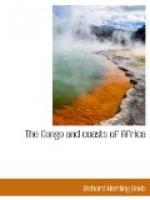He will see that the government of Leopold is not a government. It preserves the perquisites and outward signs of government. It coins money, issues stamps, collects taxes. But it assumes none of the responsibilities of government. The Congo Free State is only a great trading house. And in it Leopold is the only wholesale and retail trader. He gives a bar of soap for rubber, and makes a “turn-over” of a cup of salt for ivory. He is not a monarch. He is a shopkeeper.
And were the country not so rich in rubber and ivory, were the natives not sweated so severely, he also would be a bankrupt shopkeeper. For the Congo is not only one vast trading post, but also it is a trading post badly managed. Even in the republics of Central America where the government changes so frequently, and where each new president is trying to make hay while he can, there is better administration, more is done for the people, the rights of other nations are better respected.
Were the Congo properly managed, it would be one of the richest territories on the surface of the earth. As it is, through ignorance and cupidity, it is being despoiled and its people are the most wretched of human beings. In the White Book containing the reports of British vice-consuls on conditions in the Congo from April of last year to January of this year, Mr. Mitchell tells how the enslavement of the people still continues, how “they” (the conscripts, as they are called) “are hunted in the forest by soldiers, and brought in chained by the neck like criminals.” They then, though conscripted to serve in the army, are set to manual labor. They are slaves. The difference between the slavery under Leopold and the slavery under the Arab raiders is that the Arab was the better and kinder master. He took “prisoners” just as Leopold seizes “conscripts,” but he had too much foresight to destroy whole villages, to carry off all the black man’s live stock, and to uproot his vegetable gardens. He purposed to return. And he did not wish to so terrify the blacks that to escape from him they would penetrate farther into the jungle. His motive was purely selfish, but his methods, compared with those of Leopold, were almost considerate. The work the State to-day requires of the blacks is so oppressive that they have no time, no heart, to labor for themselves.
In every other colony—French, English, German—in the native villages I saw vegetable gardens, goats, and chickens, large, comfortable, three-room huts, fences, and, especially in the German settlement of the Cameroons at Duala, many flower gardens. In Bell Town at Duala I walked for miles through streets lined with such huts and gardens, and saw whole families, the very old as well as the very young, sitting contentedly in the shade of their trees, or at work in their gardens. In the Congo native villages I saw but one old person, of chickens or goats that were not to be given to the government as taxes I saw none, and the vegetable gardens,




